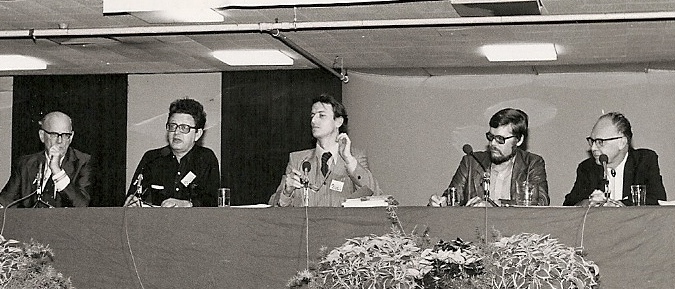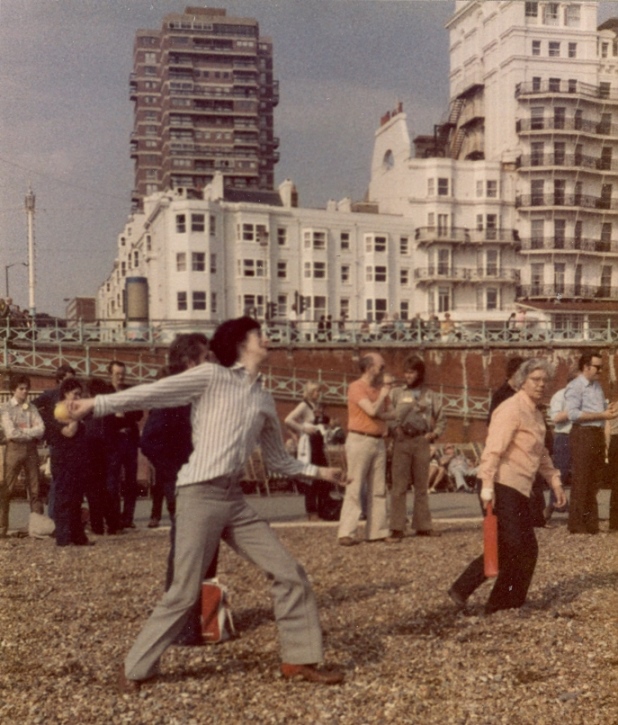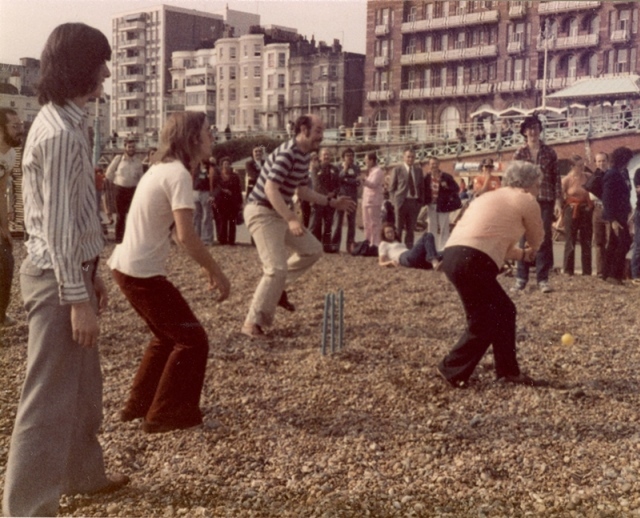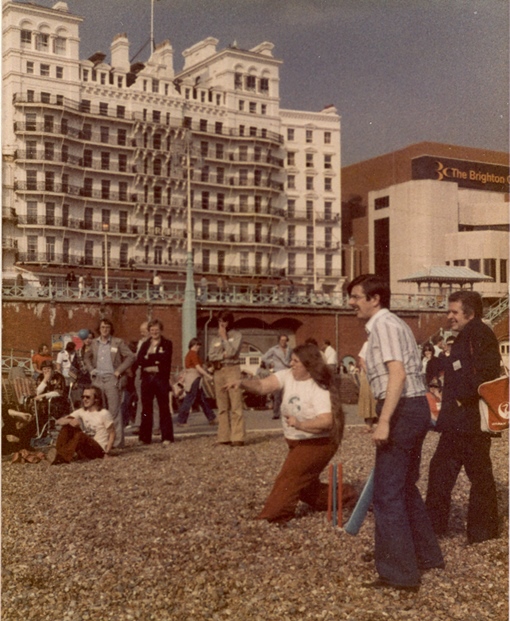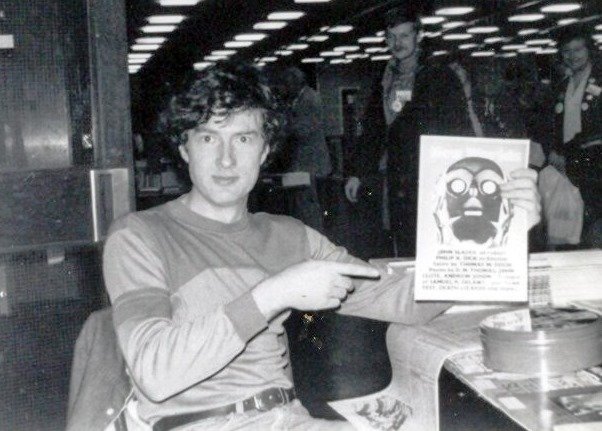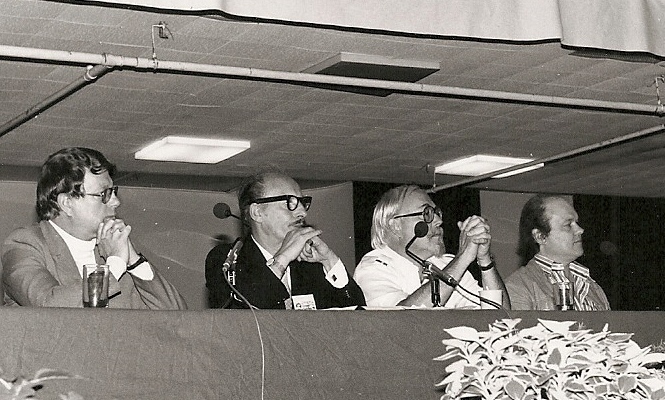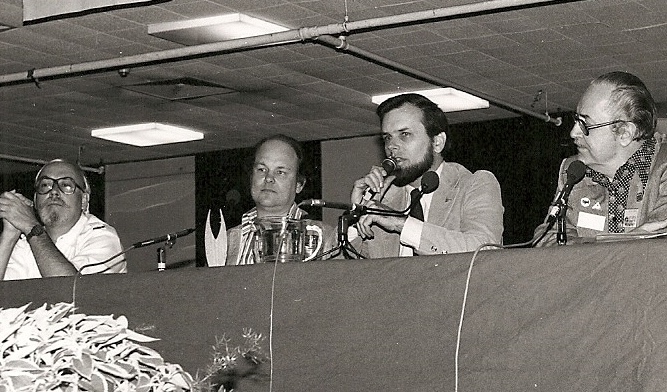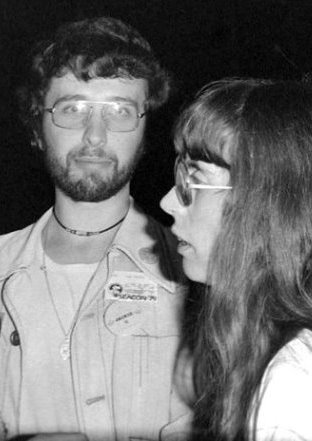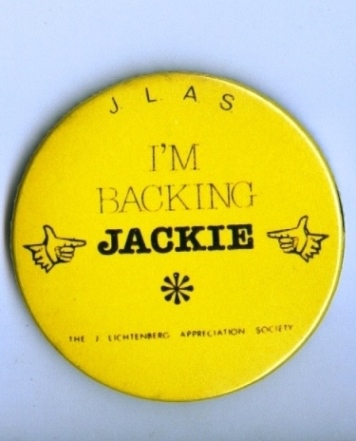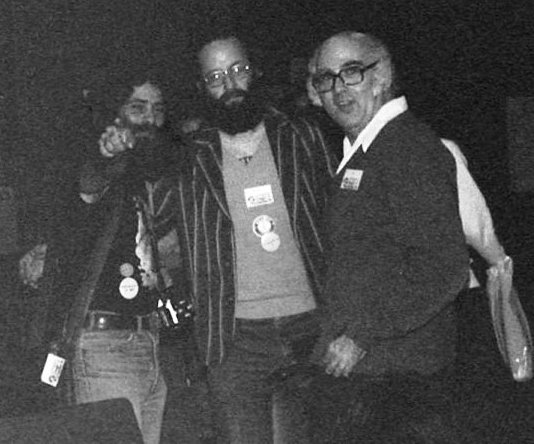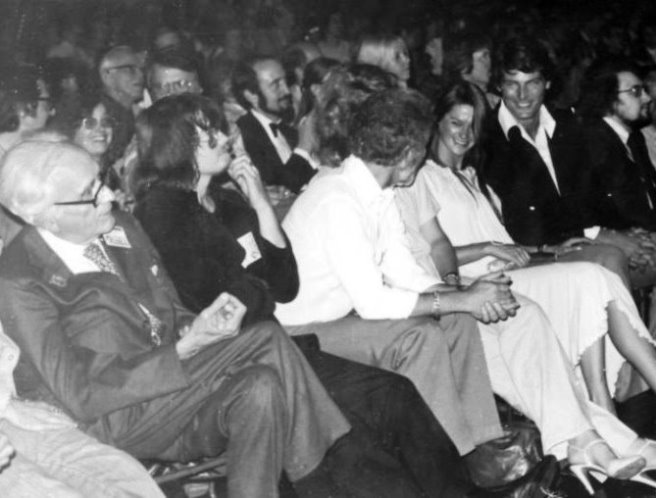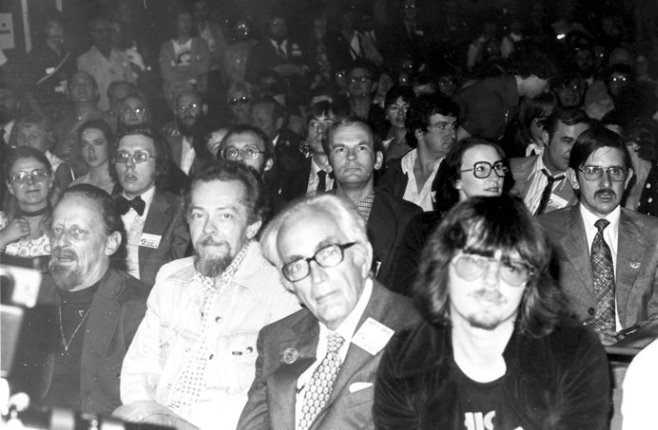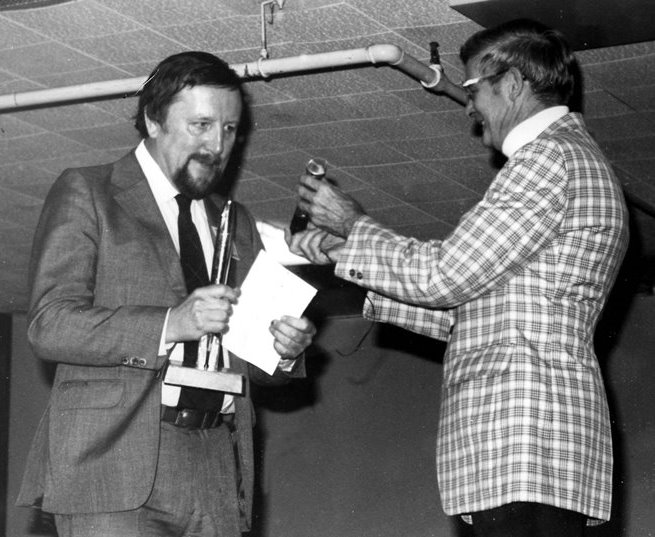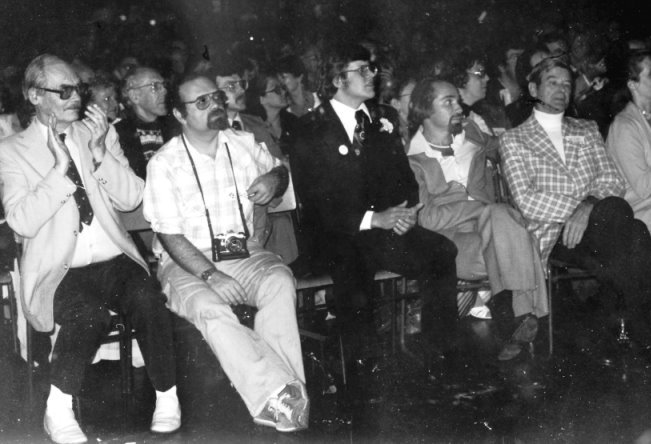|
Sunday 26th August
Those starting the day with that morning's TSAR were greeted with sad news on p.6 of the death of Walter Gillings, who was there at the birth of UK fandom.
TERRY CARR: That SFWA Suite party, despite or maybe partly because of the energy generated by such rumours, was much fun and lasted till quite late. As a result, Sunday began late for me: I ran into Norman Spinrad when the Metropole coffee shop was between breakfast and lunch set-ups; Norman was hurting due to food poisoning at a Chinese restaurant the evening before and he wanted a tender breakfast. Janet Morris joined us, said she knew just the place, and we went there. It proved to be as high-quality as she'd promised, and we had a most enjoyable brunch. Janet was chagrined because she'd just had a discussion with Bantam's representatives about what sort of covers to put on the reissues of her fantasy series; she hadn't been pleased with the covers on the first printings not only because they were poor art but also because they were sexist. "And the best idea anyone could come up with for the new editions was to hire the artist who did the Gor covers!" She said she really just wanted simple covers this time, with a plain-coloured background on each and maybe the titles or bylines done in embossed lettering, perhaps a small drawing. I thought about that, and suggested that they contract with the sculptor Dale Enzenbacher to let them use small photos of some of his fantasy figures - this would certainly result in distinctive and attractive covers. She seemed to like this idea; but as to whether or not anything will come of it... " PETER ROBERTS: Sunday came along and the con seemed to have become a way of life; my hands were becoming steadier, so my system was adjusting and all must have been going well. However, the idea of Sunday morning fan panels no longer seemed all that attractive, so I checked with the panellists and rescheduled the programme to start with the final chat show (Harry Bell, Darroll Pardoe, Joseph Nicholas, and – you guessed – me chairing) at one o'clock; bright audience and receptive to the crop of fannish anecdotes and arguments. After that the fanzine auction – there weren't many but good grief they didn't half fetch high prices: up to £8 for TAFF reports and INNUENDOs and a quid or two for FOULERs and TRUE RATs. North American and British fans even kept up with some lunatic Swedish bidding. I started worrying about woodlice eating away at my fanzines stored away in Dawlish.
Swedish fans at the convention were mostly wealthier than other fans and hit the booze harder. This last was because at that time alcohol sales in Sweden were restricted and it could only be purchased at government stores. So at Seacon they really let their hair down. After that there was supposed to be a 1965 Loncon slideshow, but despite the aid of over half a dozen willing investigators the damn projector wouldn't work. This failure of equipment had been bedevilling the main programme, but I thought we might escape. I tried to postpone the slides till the Monday, but the projector remained broken (that's why, incidentally, the closing ceremony didn't repeat the slides of past worldcon logos). I think there's an equipment hire firm that may be hearing from the convention – after all, we didn't do things on the cheap and we certainly deserved better.
Immediately after the fiddling around in the gloom show I bounced out onto the beach for the England v. Australia Grand Seacon Cricket Match. Captains Pete Weston and John Foyster were already on the field (carefully constructed of pebbles), as were the teams – though separating the latter from the audience was none too easy. The opposition seemed to have a lot of South Africans, Americans, and Canadians for an Australian team, but no matter. I actually got a chance to bowl and get someone out – more than I ever did at school. We would've beaten the Australians, of course, had it not been for some unorthodox play (Joyce Scrivner thundering down the beach for a wild baseball pitch – the resulting six only stopped by Mike Glicksohn's rugby tackle of the batsman. Is this cricket?).
JOHN FOYSTER: On the morning of the inaugural UK versus Australia fannish cricket match, so many Australians were unwell and unable to play for their country that the 'Australian' team finally included members as tenuously linked with Godzone as Mike Glicksohn (justification: he had once visited Australia, in 1975). The match itself was played on a pitch strange to Australians – a beach consisting of large pebbles (this undoubtedly explains the poor form of the few Australians actually in the team). Even Australian beach cricket is played in conditions superior to these. It can't be denied, however, that the UK team was by far the better. Whether the result should have been declared a draw or not remains moot, but Mike Glicksohn and I should have received some award for best rugby tackle on a player moving between the wickets.
KEV WILLIAMS: A tall slim Victorian dandy tentatively entered the Opsroom one morning. By this time we were used to people coming in dressed in anything. This guy was wearing breeches, knee length boots, full length dress coat with lemon coloured piping and a ruff at his neck. He spoke in a serious tone.
"I think that you ought to know that there is another convention taking place
in Brighton this weekend a .... homosexual convention." He backed out of the room, his face pale, mine red. TERRY CARR: Back at the Metropole, I ran into Tom Schlück, looking only slightly older than he did when he won TAFF a dozen years ago; these days he's a translator and literary agent in Germany. As we were talking outside the hotel a fellow came up to us and asked if the science fiction convention was a closed meeting or anyone could go in; Tom said, "Certainly you can Join; Just go right through the lobby to the registration desk on the left and sign up. You'll get to attend all the panel discussions and hear famous authors reading from their works; there are lots of movies being shown, rare books and magazines for sale, and thousands of people to talk with. Don't forget to go to the art show." Tom pointed him in the proper direction and the fellow ventured inside, looking a trifle bewildered. Tom beamed after him; "Another one for our side," he said. I m sorry' it's over. I'm being very fair about you in my novel I know you'll be fair about me in yours.
We went inside ourselves, and I came across Charles Platt, who didn't look very happy. "Uh...was that true, what I heard about Jerry Pournelle threatening to sue you?" I ventured. He nodded. "It was so stupid of me to use that word. It was Just in a letter to Dick Geis, but I should have known he'd publish it." "Well, why don't you offer to make a public apology to Jerry?" Charles looked even more morose: "I did, but he was too angry to be satisfied by that; I think he really will sue me." I thought for a minute and said, "Look, Jerry has a temper but he's a reasonable man. Try this: wait till after the convention, when Jerry's calmed down a bit, then write a public apology for Geis to print, and send a carbon copy to Jerry along with a private apology. I think that would take care of it." Charles looked slightly more happy: "All right, I'll try that." I went off to lunch with John Bush, during which we discussed methods that would allow him to publish The Best SF Novellas of the Year in addition to The Best SF of the Year, which he's been doing for several years; we worked out some simple logistics that should make the system work. Then I asked him about his room-party the night before: "I know Jerry Pournelle was awfully angry at Charles Platt, but Brian Aldiss too? Brian's always been such a. pleasant sort." John chuckled: "Oh, Brian and Charles were only kidding; Brian's rather a cut-up, you see. When I went into the other room where they were supposedly fighting, I found them stomping their feet and pounding on the walls. It was a send-up."
At 1pm on the main programme was 'SF Movies' with Val Guest, Gary Kurtz, Harry Harrison, Forrest Ackerman, and others:
CHRIS PRIEST: Seacon was the first large convention to be held in Britain since the invention of something called a "SFWA Suite". This is an area of the con-hotel set aside for the exclusive use of writers, one to which they can retire and enjoy a quiet drink with their colleagues, one where they can be themselves, and one where they can find temporary sanctuary from the vexations of fame. ...certain authors carried their "fame" with ill grace and bad manners. Such authors were in a minority, but their behaviour was so noticeably arrogant that many of their colleagues were embarrassed by the thought that they might be identified with them. Although this obnoxiousness is still a minority phenomenon, anyone who follows trends in the sf world cannot help but have noticed that this kind of attitude is spreading. One hears of writers wanting to charge convention-committees for their services (on the principle that fans only go to conventions to see them). Authors use their "position" at conventions to publicize causes. Some authors start and administer fan-clubs for their own books. One author even had the temerity to expect the Seacon committee to set aside a special room for her exclusive use, so that she could hold audiences for her fans. This attitude sees fandom as existing only to feed the egos of authors, and is thus essentially contemptuous of it. As I am a writer with fannish roots, and am still to a degree active in fandom, I cannot help but find this attitude repellent. Quite apart from a sense of being indirectly slighted, it strikes me that it is inimical to the natural and beneficial harmony that has existed in the science fiction world for many years. Having been a member of SFWA (Science Fiction Writers of America) for nearly ten years, I have come to the conclusion that the breeding-ground for these attitudes lies there.
The author who expected the Seacon committee to set aside a special room for her exclusive use was Jacqueline Lichtenberg. British fandom's response was, of course, mockery. KEV WILLIAMS: Then there was the Jacqueline Lichtenberg affair. A marvellous British joke on the pomposity of this same group. The affair has been reported elsewhere, but in the Opsroom we had a slightly different angle. For a start - we knew sod-all. The first we knew, was 10:00 one evening. Two women that I had never seen before in my life burst into the Opsroom. One of them thrust a piece of paper into my hand.
"This is jest disgraceful! We're going to call the police!" The paper was of course the Jacqueline Lichtenberg Appreciation Society newsletter. I hadn't seen it before, and on reading had great difficulty keeping a straight face. (For those others not in the know - it was a deliberately simplistic "fan club" letter loaded with ego bursting barbs). This letter had apparently been stuck on the walls of the hotel and conference centre.
"What's wrong with it.'" I said ingenuously. I went across to the Suvverner and told him what was going on with, of course, my own personal colouring. We both agreed to nod seriously as if agreeing on some decisive action. This was for the benefit of the two women who were watching from across the hallway. I adopted my best Frank Bough soothing and concerned face and went back to the women. "It will be taken care of", I said with as much reassurance and authority as I could muster. To my amazement, it worked, and they walked off agreeing how monstrous etc etc. But of course the joke went on and reached its peak with a certain hairy arm doctoring the sponsor board with "THIS SESSION SPONSORED BY JACQUELINE LICHTENBERG" during the Hugo awards ceremony.
TERRY CARR: There was a SFWA Meeting scheduled... so when we'd finished lunch I dashed off to the booksellers' room, where I'd been announced as holding an autograph session at the same time; I put a message over the p.a. system cancelling the autograph session, then hurried to the SFWA Meeting. These things, as I've mentioned in reports on previous conventions, are invariably long and dull, but matters of monetary importance to me and everyone else in the sf field are usually discussed and important decisions made, etc. --Hot so this time, though: the current SFWA administration under President Jack Williamson had pretty much cleared up past problems, and there was no new business, of note. Each time someone rose to discuss an issue, Bob Silverberg would point out that we had a committee to deal with that and we should wait for its report. The SFWA- . Meeting ended in twenty-five minutes, much to the surprise of all, including President Williamson, who remarked, "This must be the shortest SFWA Meeting in history." DAVE LANGFORD: Overweening hubris led me to the SFWA suite and an attempt to sign up. Oh, they said. Oh, we never thought anyone from Britain would want to join. So we didn't bring any application forms; so there. I spent the rest of the con in the fan room; it felt just like an Eastercon, though somehow I missed all the traditional clashes with heavily-armed security. The gap was filled when, as I left the Metropole one night, I was searched on suspicion of harbouring stolen cameras. This still rankles (as does the distressing fact that I was fuller of whisky than witty repartee, and accepted the outrage in blank silence); however, Seacon felt precisely like a traditional UK con after that. The American accents were one hint that something bigger was happening Out There; another was the feeling of a vast echo-chamber in which the con's rumours were reverberating. TERRY CARR: I think it was Ted White who gathered the dinner-party that night: he and I, Sid and Diana, Brad Balfour and Susan Wood trekked off to an Italian restaurant where Ted had eaten the night before. The food was good, and if the waiters were a bit rambunctious in their kidding of the patrons ("You want pepper in your soup? Okay, if you say so. There, that's enough? No? More? Okay, more pepper for the crazy Americans!") perhaps we were a bit rambunctious ourselves. On our way back to the Metropole we passed a Lebanese restaurant in which we saw Ian Watson and his wife dancing around balancing water glasses on their heads while Greg Benford, resplendent under a red fez, clapped enthusiastically in time to the music. It was a very funny scene, and maybe our party hadn't been the only one that had become rambunctious that evening.
JOHN FOYSTER: I'm not a fan of banquets, and suspect that I never will be. But one of the punishments inflicted on people like GUFF winners is recognition at things like banquets. Thus I was offered a free meal (provided I sat at the top table) and, having paid £7.50 for fish and chips the night I went out with Nils Dalgaard, Ellen Pederson, and Erik Swiatek, I accepted gratefully. I was seated between Roy Kettle and Peter Roberts, two of the funniest people in British fandom, in my opinion, and certainly just what one needs to keep one's mind off what one is eating. As it happens, we somehow got the idea of rating each course on a 1-10 scale. This disease spread along the table to Bob Tucker, who communicated it (in a manner I'd rather not describe) to the group table in front of him (junior Omni executives, I believe). Overall, I think our ratings would have been quite objective had it not been for Peter Roberts being a vegetarian and insisting on his ratings for plates of grass-like courses being included in the overall scheme. Peter wasn't the only person eating grass-like substances at the banquet, as we discovered when, after having waited more than a few moments after the omnivores had been fed, Peter discreetly inquired about the arrangements for vegetarians. "Don't worry, sir. there are 43 similar gentlemen here tonight," the waiter whispered loudly. Those within hearing distance chuckled and looked around for another 43 orange-suited longhairs... Of course, when Peter's 'food' arrived it was of the grass-like nature referred to above. But at least we were able, all through the evening, as one after another of these culinary disasters was served up to Peter, to reassure him that 43 others were going through similar agonies. The virtues associated with collective suffering didn't seem to appeal to him at all. The interesting conversations were – for me at least – just within earshot, but they were regularly interrupted by speeches (none of them too long or too bad). In addition, Robin Johnson had arranged for some Australian stfnal awards to be presented during the banquet, and I had to make a short speech myself while presenting a Ditmar to Anne McCaffrey. TERRY CARR: The Hugo Awards ceremonies were presented separately after the Banquet, and once again I got to exercise the one prerogative afforded Hugo nominees who don't have a prayer of winning: I had a reserved seat in the second row along with William Rotsler, Susan Wood, Malcolm Edwards and Pete Weston.
William wanted to bet me that Harry Bell would win as Best Fan Artist, but I declined to bet in a category in which William was himself a nominee. He won the award, and when he came back to his seat beaming I tried to take advantage of his elation by conning him: "You owe me five pounds on our bet." But he brushed aside the gambit. DAVE LANGFORD: An inauspicious opening note to a successful SEACON was the discovery by the committee shortly before the con that the engraver had disfigured the Hugos with assorted misspellings and the incorrect date (Seacon 1978). Corrections were made in time to prevent embarrassing tantrums by recipients of a "Science Fiction Agheivement" award.
TERRY CARR: Bob Shaw was the toastmaster, and he was as usual delightful and witty. (He'd given a talk earlier that day that had kept about a thousand fans, all that could fit into the main hall, chuckling and chortling for an hour.) Bob is very popular in England and everywhere, so when Bob Tucker announced that he'd won the Hugo for Best Fan Writer he got a huge ovation. He jumped up and clicked his heels in delight.
A description I'm sure Bob would've agreed with is that he was a fan whose day job was writing science fiction, so his delight was understandable. The award for Best Fanzine wasn't nearly as popular. Charlie Brown, who'd had the grace to withdraw from Best Fanzine contention the magazine from which he earns his living, announced the award, and his slightly disgusted tone of voice when he opened the envelope and said, "The winner is...SCIENCE FICTION REVIEW" was worthy of a Best Dramatic Presentation nomination itself. Few people applauded the award, and when Charlie asked who'd accept for Dick Geis, no one cane forth. Charlie began inviting people by name to come up and accept the award, but each shook his head. Finally, after three or four people had declined, Charlie called on Fred Pohl, and Fred, probably fearing that the program would never continue if someone didn't accept, came forth. He said, "I'm pleased to accept this award for Dick Geis, a man I've always respected...but not much." (Laughter; cheers.) "But by God I do enjoy reading his magazine," Fred added. The perfect touch of grace, I thought: Fred deserves a Best Dramatic Presentation nomination too.
The Let's Trash Dick Geis Session didn't end there, though. Bob Silverberg was called to the podium to present one of the other Hugos; he mounted the dais carrying Geis's award and said, "Before I present this next award I want to take care of some unfinished business. Fred Pohl accepted the award for SCIENCE FICTION REVIEW and then dropped it into my lap to take back to Dick Geis. I live in California; Geis lives in Oregon, hundreds of miles away. I don't feel like carrying this thing back in my luggage - isn't there anyone here who's from Oregon who'll come up and take this?" Again there was a long wait, until someone did indeed come forth - I don't know who it was.
Per SCIENCE FICTION REVIEW #33 the award did eventually get to him:
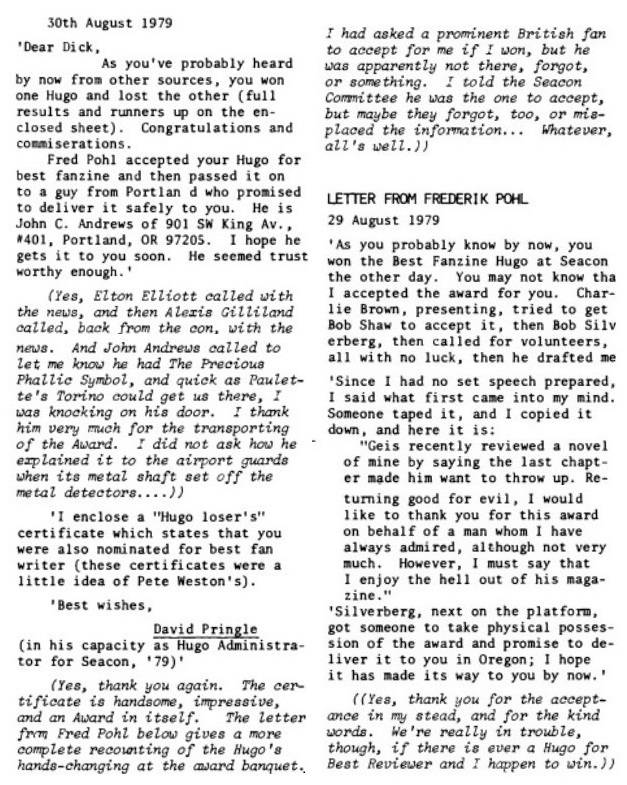
PAUL SKELTON: 'Hitch-Hikers' Guide To The Galaxy' didn't win. That wasn't so annoying in itself but what really *SKHNKLED* was the applause for the various contestants as they were announced, from which it was evident that had the US fans been able to hear it before they voted it would probably have won. Even Superman had to admit as much when collecting the award. However, let's break off from this listing as the HUGO results/awards are something at which I wish to write at length. Yes tinies, the HUGOs left a nasty taste. Like all the other flea-brained, cretins I laughed like a drain when they took the piss out of Geis at the awards ceremony, even to the extent of handing the award over to some guy in the audience to deliver, simply because he came from the same state. However, I later had to agree with Mike and Pat Meara that it was in very poor taste and I was suitably ashamed of myself. Shit, those awards are supposed to be where we honour the best among us. *That* was 'honouring'? Pat is right;. If Geis honestly thinks that what "he produces is a fanzine then he is perfectly entitled to let it be nominated. If the powers that be *don't* think it's a fanzine, then they should have the guts to make a stand and ban it. And that some committee should have the guts to make such a stand is borne out by another result of the HUGO voting- which pissed me off even more. Take the 'fanzine' and 'fanwriter' categories. Especially take the 'fanwriter' category. The result was:- 1 Shaw, 2 Geis, 5 No Award. No-fucking-award in thira place, for Christ'sake, ahead of Langford, Kettle and West. Now I don't personally care for the writing of D.West but I acknowledge his ability. There is only one way anyone could vote no award ahead of these three and that is if they are unfamiliar with their work., OK, but look you pathetic excuses for a gnat's turd, if you aren't familiar with 60% of the nominations in a particular category then you just ain't fucking qualified to vote in that category. It's that simple. Your votes are meaningless and what is more you rendered the award itself meaningless. GO AWAY AND SIN NO MORE!
I completely agree. There's a reason why I don't care about the Hugos and have paid little attention to them in the almost half-century since Seacon '79. This travesty is that reason. TERRY CARR: About this time someone pointed out to me that we were sitting almost directly behind Christopher Reeve, the star of Superman. I was startled and delighted: gosh, a celebrity from the real, or at least not strictly science-fictional, world! I hadn't thought the movie was any sort of exemplar of sf moviemaking, nor am I in love with Christopher Reeve (as so many women are), but I was glad to see that he's every bit as tall and handsome in person as he is on the screen. He's just as Intelligent as his performance suggested, too, for when the nominees in the Best Dramatic Presentation category were read, The Hitchhiker's Guide to the Galaxy got an ovation much greater than that for Superman, and when Superman was announced as the winner (by Gary Kurtz, the producer of Star Wars and its forthcoming sequel), Reeve began his acceptance speech by saying, "After hearing the applause for The Hitchhiker's Guide to the Galaxy, I think this award must have been rigged; I salute the producers of that show."
The other awards? I applauded some, was chagrined by others; that's the usual state of affairs for all of us, isn't it? I did at least feel vindicated when Stephen R. Donaldson won the Campbell Award for Best New Writer, even if he did beat Lizzy Lynn: after all, I'd predicted it more than a year before. TERRY CARR: Dave Hartwell was holding the Hugo Losers' Party, so after a quick trip to my hotel to pick up a fresh name-tag I went to the Pocket Books Suite. Rotsler had given me two new name-tags the first day of the convention; one said CURRENTLY SPEAKING TO: followed by ten lines to be filled in, and the other was similar except that it said NOT SPEAKING TO:. I chose the latter as more in keeping with a Hugo Losers' Party. When I entered I ran into a bunch of women animatedly talking about Christopher Reeve. "When I saw him, I just broke up laughing - all I could think of was *Superman* has come to the convention'!" said Ginjer Buchanan.
"Vonda got invited to go and meet him at the Hugo reception the
Committee's holding," Suzie Tompkins said. (McIntyre had won the Best
Novel award for Dreamsnake.) "When she comes back, let's tear her eyes
out." (Actually, I was thinking of Fritz Leiber.) I went inside, got a drink and wandered around talking with Sid Coleman, Sherry Gottlieb, George Scithers and George Turner. Charles Platt and I went out for more ice, but there was none to be had at that hour. Returning to the party, I cornered Dave Hartwell and sold him three books. ...Doesn't that sound Impressive? In truth, I just asked him if he'd like to publish the three volumes of New Worlds of Fantasy as a Gregg Press omnibus; he said sure and gave me two Brazil nuts as a down payment. PETER NICHOLLS: The following bit of dialogue was reported to me. "Do you know that you look exactly like the young Einstein?" said an admirer to American physicist-fan and hot-tip-for future-Nobel-Prize, Sid Coleman. "Really?" drawled Coleman, "the effect I was aiming at was more the young Ringo Starr." I did find out that Peter Roberts has a job collecting dead seagulls from Devonian beaches at £1 an hour. This strikes me somehow as the ultimate in satisfactorily fannish modes of employment. PETER ROBERTS: There were parties again in the evening and I finally ended up on the early morning beach with a half dozen or so all-night fans.
| |||||||||||||||
|
